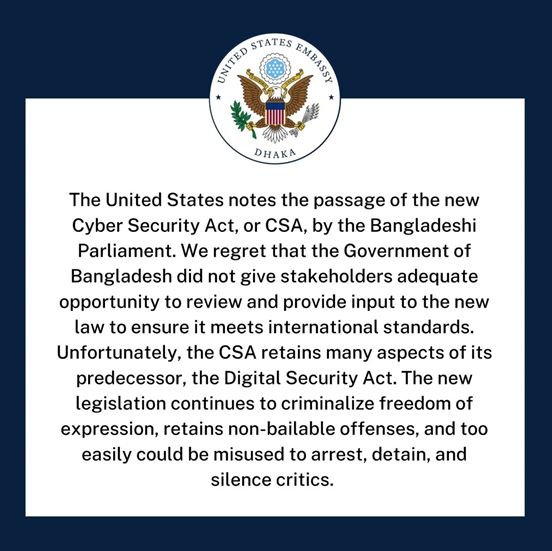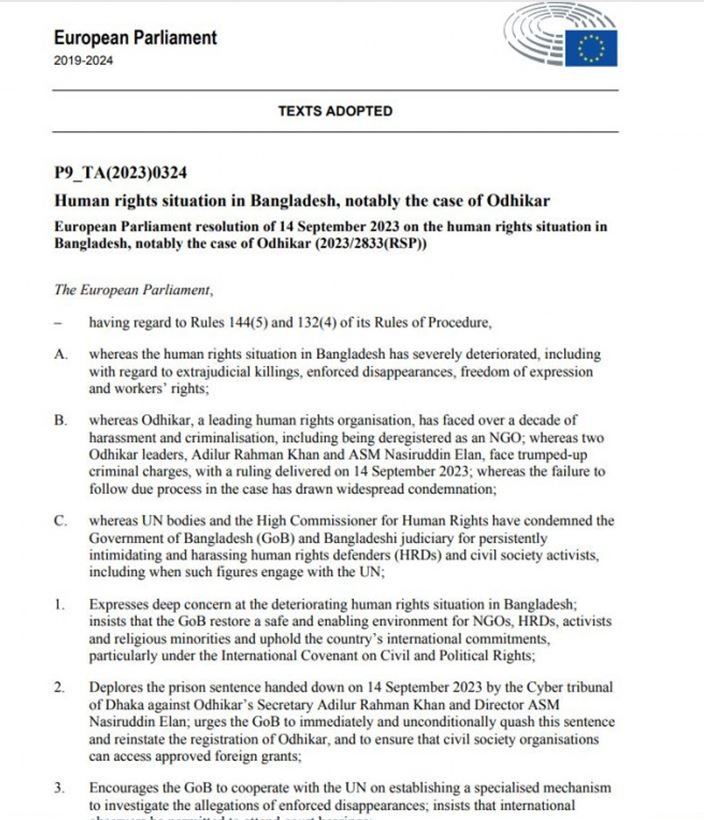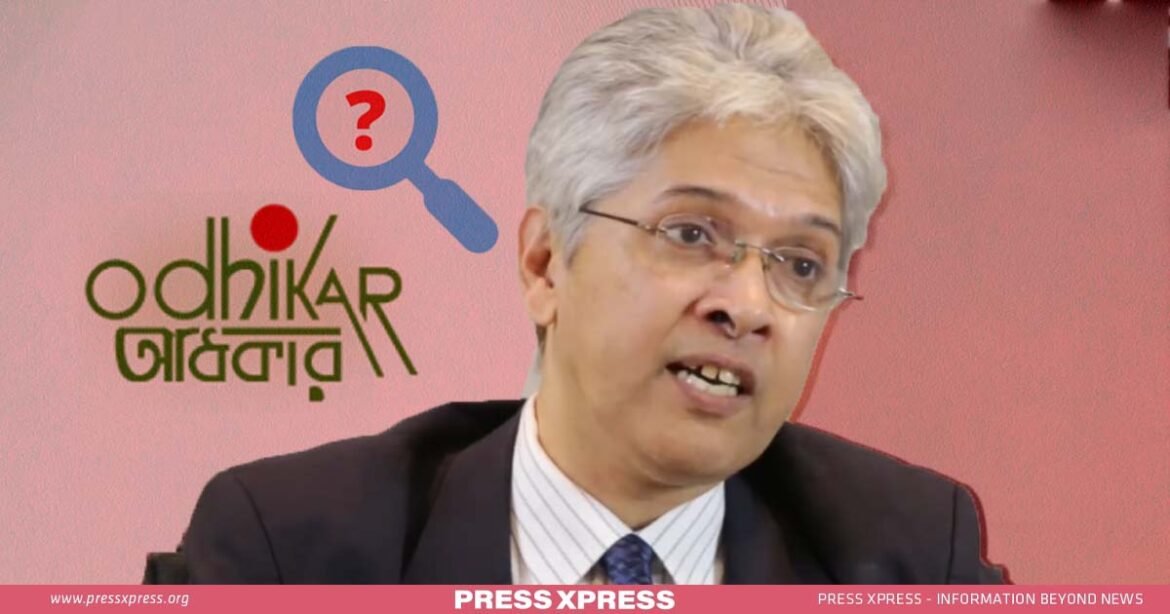Recently, Adilur Rahman Khan, the editor of the human rights organization ‘Odhikar,’ and Nasir Uddin Elan, its director, were sentenced to two years in prison by a Cyber Tribunal. This legal action stemmed from accusations of “spreading confusion” regarding the casualty count during the 2013 operation at Shapla Chattar in Motijheel, where Hefajat-e-Islam leaders and activists were dispersed. In addition to the prison sentence, they were fined 10,000 takas, with an additional month’s imprisonment stipulated in case of non-payment. Following the verdict, both Adilur Rahman Khan and Nasir Uddin Elan were incarcerated.
After the 2013 Law enforcement’s action at Shapla Square, opposition political parties critical of the government claimed that “many madrassa students had died” during the police intervention. These allegations gained momentum through social media campaigns orchestrated by anti-government factions.
Subsequently, Odhikar, the human rights organization, published a report asserting that 61 individuals had lost their lives during the police action at Shapla Chattar. This report drew a strong reaction from the government, leading to the filing of legal charges against two senior officials of Odhikar.
Upon the announcement of the verdict, the state’s legal representative commented, “By publicizing the list of 61 casualties, they not only damaged Bangladesh’s reputation domestically but also globally. Furthermore, disseminating false information created negative sentiments among Bangladesh’s Muslim population. Such actions are a grave offense.”
Numerous foreign human rights observers were present in the courtroom during the verdict’s pronouncement, although they chose not to comment on the matter.
Case Summary
The verdict in this case was delivered on 14th September afternoon, nearly a decade after the law enforcement operation aimed at dispersing Hefajat-e-Islam activists from Shapla Chattar in Motijheel in 2013.
Initially, after arguments were presented by both the state and the accused on August 24th, September 7th was designated as the verdict date. However, as the judgment was not prepared on that day, the announcement date was rescheduled, and a new date was set for September 14th. The trial for this case began on January 8, 2014.
On May 5 and 6, 2013, charges were filed against Adilur Rahman Khan, the editor of the human rights organization Odhikar, for spreading false information regarding the gathering of Hefajat-e-Islam in Dhaka’s Motijheel and the subsequent law enforcement operation. Consequently, he was arrested on August 11 of the same year and later released on bail.
During that period, law enforcement authorities contended that the Odhikar Motijheel human rights organization’s list of 61 casualties resulting from the law enforcement operation at the Hefajat-e-Islam rally in Shapla Square was both inaccurate and misleading. The government’s official stance reported a death toll of 13.
Subsequently, the government requested information from Odhikar regarding the 61 ‘deceased,’ but Odhikar declined to provide the requested details.
What Occurred on That Day?
On that fateful day, Hefazat-e-Islam, an organization centered around Qaumi madrasas in Bangladesh, initiated a blockade program in Dhaka, articulating 13 demands related to perceived insults against Islam by certain bloggers.
The events of May 5, 2013, unfolded as Hefazat-e-Islam’s blockade of Dhaka and its occupation of Shapla Chattar gave rise to widespread violence. Additionally, the early morning operations conducted by law enforcement forces to clear the occupiers from Shapla premises stirred significant controversy.
During the day, negotiations commenced between Hefazat-e-Islam and the Law enforcement, who initially sought permission to occupy Shapla Chattar. As discussions progressed, Anwar Hossain, the senior officer of the Dhaka Metropolitan Police at the time, ultimately granted permission for Hefazet Islam to gather at the square under the condition of offering prayers and concluding their program. However, violent incidents persisted in the Bangabandhu Avenue and Paltan areas well into the evening.
Within Paltan and Motijheel, Hefazat-e-Islam activists carried out extensive acts of vandalism and violence. Around 1:30 p.m., leaders and activists of Hefazat-e-Islam arrived from various entrances of Dhaka and positioned themselves at Shapla Square. The streets surrounding Baitul Mokaram Mosque, from Paltan Junction to Baitul Mokaram Masjid, witnessed buildings set ablaze, ongoing clashes, and violence, effectively transforming the entire area into a conflict zone.
Many Hefazat leaders believed that certain quarters aimed to undermine the 13-point movement of Hefazat, countering the large-scale movement in Shahbagh that demanded the maximum sentence for war crimes trials. Jamaat-e-Islami also played a strategic role in these events.
The discrepancy in the reported death toll following the raid. triggered a substantial political debate, with various groups spreadin rumours that as many as 2,500 people had lost their lives. The police, however, maintained that one of the injured individuals from the raid later succumbed to their injuries at the hospital.
Dissemination of Misleading Information by Odhikar
A group operating under the banner of the human rights organization “Odhikar” has come under scrutiny for spreading fabricated information concerning the casualties, both domestically and abroad, following the night operation conducted by Hefajat-Jamaat in the aftermath of the tragic events of May 5. Persistently, this organization releases reports accusing the government of being responsible for the deaths of 61 individuals and the disappearance of numerous others, employing the rhetoric of Hefazat-Jamaat. However, Odhikar has failed to provide clarifications or substantiated details regarding this information.

By invoking the banner of human rights and disseminating false data, domestic and foreign extremist groups such as BNP, Jamaat, and Hefajat have found opportunities to advance their political agendas. Unfortunately, Odhikar has not cooperated in providing the identities, paternal lineage, residential addresses, or other essential particulars of the purported victims, despite the Information Ministry’s requests.
In the meantime, BNP and Jamaat, in their quest to exploit the vulnerable students of madrasas, have propagated not only for their rights but also for the claim of 3,000 deceased and hundreds of thousands missing. To date, Hefazat has not unveiled any comprehensive list of these supposed casualties. They initially pledged to search madrasas and compile a list of the missing individuals, but despite two months of effort, they were unable to publish such a list. This failure raises doubts about the credibility of their assertions. Some Islamic groups and organizations have decried this distortion by Hefazat as a criminal act.
The Ministry of Information has repeatedly sought information about the “victims,” including their names, addresses, paternal lineage, and place of residence, through the Right to Information, but it has encountered difficulties in obtaining these details. Odhikar, when approached by the government for information, has remained conspicuously silent.
Nevertheless, various online propaganda campaigns concerning the events of that night persist unabated. Some images from the earthquake in Haiti have been circulated as depicting “killed” security personnel, further contributing to the dissemination of misleading information.
International Reaction
Amnesty International, a prominent advocate for human rights, has voiced its deep concern on Twitter, denouncing the Dhaka Cyber Tribunal’s decision to sentence Adilur Rahman Khan, the leader of the human rights organization Odhikar, and ASM Nasir Uddin Elan to a two-year prison term under the repressive ICT Act. This verdict comes after a decade marked by enduring state persecution and allegations.
Amnesty International went on to emphasize, “The case was initiated in response to the release of a fact-finding report that meticulously documented extrajudicial killings by the state during a protest in 2013. The government’s clampdown on fundamental rights and its leaders constitutes an attack on the capacity to expose the truth in the face of those in power.” The central question remains: who is genuinely conveying the truth?
The United States has expressed strong support for the pivotal roles played by human rights advocates and civil society organizations in upholding and protecting human rights and essential freedoms. In its 2022 Country Report on Human Rights in Bangladesh, the United States highlighted “significant restrictions on freedom of expression, both online and offline,” acknowledging that human rights groups faced “considerable government constraints.” In this context, the United States Embassy in Dhaka has expressed apprehension that the recent verdict against Adilur Rahman Khan, the Secretary of Odhikar, and Director A S M Nasiruddin Elan could further undermine the ability of human rights defenders and civil society to fulfill their vital democratic roles. Over the years, Odhikar has consistently monitored and reported on the human rights situation in Bangladesh, irrespective of the ruling authority. The United States remains steadfast in its commitment to supporting freedom of expression and a thriving civil society as integral pillars of democracy, and it firmly opposes any endeavors to curtail the exercise of these fundamental rights.

In August of 2013, after the arrest of Adilur Rahman Khan, the then US Ambassador to Bangladesh, Dan Mozena, paid a visit to the Dhaka office of the human rights organization Odhikar. This visit saw the involvement of diplomats from Switzerland, Sweden, Canada, and several other Western countries. During this visit, human rights officials took note of inquiries made by American ambassadors and diplomats regarding the organization’s overall status and the well-being of Adilur Rahman Khan. Concurrently, the United Nations issued a statement advocating for the release of Adilur Rahman Khan, the human rights editor.
When it comes to the Cyber Act issue, it prompts us to consider whether intervening in the internal affairs of an independent sovereign state, without a comprehensive understanding of the facts, could potentially be seen as a violation of international law.

Criticism has been directed at the European Parliament for what some perceive as bias against the state. It is imperative to carefully examine the content of their statements and resolutions to gain a more precise understanding of their position.
Statement from the Ministry of Foreign Affairs, Bangladesh
The Government of Bangladesh wishes to express its profound disappointment regarding the adoption of a resolution by the European Parliament on September 14, 2023, addressing the “Human rights situation in Bangladesh, notably the case of Odhikar.”
We find both the timing and the language used in this joint motion, which was presented by specific political groups within the European Parliament, to be a matter of concern. It seems to involve prejudicial comments on ongoing legal matters and a court verdict concerning two officials from ‘Odhikar’ that was issued in Dhaka on the same day. Such actions appear to indicate an intention to interfere in the affairs of an independent judiciary within a sovereign state.
Bangladesh’s independent judiciary is dedicated to conducting transparent and fair legal proceedings, ensuring the full protection of the rights of all parties involved. The decisions made by the Bangladeshi judiciary are based on evidence and are in accordance with the law. These decisions are made without any constraints, influences, inducements, pressures, threats, or external interference, whether direct or indirect, from any source or for any reason.
We are deeply concerned about the apparent bias evident in the European Parliament’s resolution towards ‘Odhikar,’ an organization that is non-compliant and politically biased. This organization has a well-documented history of disseminating inaccurate information and has affiliations with interests that promote terrorism and violent extremism. It is widely known that Mr. Adilur Rahman Khan, the Secretary of ‘Odhikar,’ served as Deputy Attorney General during the BNP-Jamaat Government from 2001 to 2006. Consequently, ‘Odhikar’ cannot reasonably be considered a neutral or independent entity, despite its claims to the contrary, a fact that regrettably remains unacknowledged by certain members of the international community.
Endorsing and supporting an organization like ‘Odhikar’ in the name of safeguarding civic and democratic space reveals a subjective, selective, and partisan approach. It represents a clear example of double standards, as it advocates for the human rights of victims on one hand while actively working to protect the alleged violator on the other.
The Government of Bangladesh respectfully disagrees with the content of the resolution. Bangladesh deeply values its longstanding 50-year partnership with the European Union and all its institutions, including the European Parliament. We look forward to continuing this partnership through meaningful engagement, founded on the principles of mutual respect and non-interference in each other’s internal affairs.
Reactions from Dignitaries and Civil Society
Foreign Minister AK Abdul Momen: Foreign Minister AK Abdul Momen strongly criticized recent statements from foreign sources regarding Bangladesh’s politics and upcoming national parliament elections. He reiterated that democracy and human rights are fundamental principles of the Awami League government. He called on all countries, including the United States and Russia, to honour Bangladesh’s sovereignty by refraining from involvement in its internal affairs.
Information Minister Dr. Hasan Mahmud: Dr. Hasan Mahmud emphasized that it is inappropriate for diplomats to interfere in Bangladesh’s internal affairs. He referred to the Vienna Convention on Diplomatic Relations as a reminder to diplomats regarding their conduct. These remarks were made during a press briefing in Chittagong city.
Agriculture Minister Abdur Razzak: Minister Abdur Razzak firmly asserted that Bangladesh would not tolerate any ambassador’s intervention in its internal matters, underscoring the nation’s status as an independent sovereign state. He cautioned against such interference and stressed the importance of upholding the nation’s dignity and self-respect.
Fazle Hossain Badsha: Fazle Hossain Badsha expressed his disapproval of the United States’ involvement in Bangladesh’s internal matters, viewing it as a breach of diplomatic decorum. He emphasized that the people of Bangladesh have the right to determine their country’s economic, political, and social affairs without external interference. Consequently, he urged U.S. diplomats to abstain from meddling in Bangladesh’s domestic affairs. Badsha also raised questions about the U.S.’s stance on human rights, citing their support for the Pakistani government during the 1971 conflict, which resulted in immense suffering for
Former Ambassador Major General (Retd.) Shahidul Haque: Major General (Retd.) Shahidul Haque invoked the Vienna Convention, which governs the conduct of ambassadors and diplomats. According to this convention, diplomats have well-defined roles and responsibilities, including refraining from interfering in the internal affairs of host countries. Haque stressed that diplomats should abstain from offering opinions on such matters.
Measures Taken by the Government
The parliamentary committee has issued a recommendation urging the Ministry of Foreign Affairs to collaborate with relevant ministries to counter misinformation and false rumors. Committee President Muhammad Farooq Khan stated to the media, “I have proposed that the Ministry of Foreign Affairs take actions to combat baseless rumors and unfounded information circulating against the government. Furthermore, I have suggested that they coordinate their efforts with other ministries involved in curbing the dissemination of such false information.”
Previously, the parliamentary committee had advised the ministry to address anti-government propaganda spread through social media.
The ministry has indicated that Bangladeshi embassies and missions in countries where false propaganda against Bangladesh is being disseminated are ready to respond to these allegations. Additionally, they are actively engaging with various international media outlets to promote the government’s positive image.


